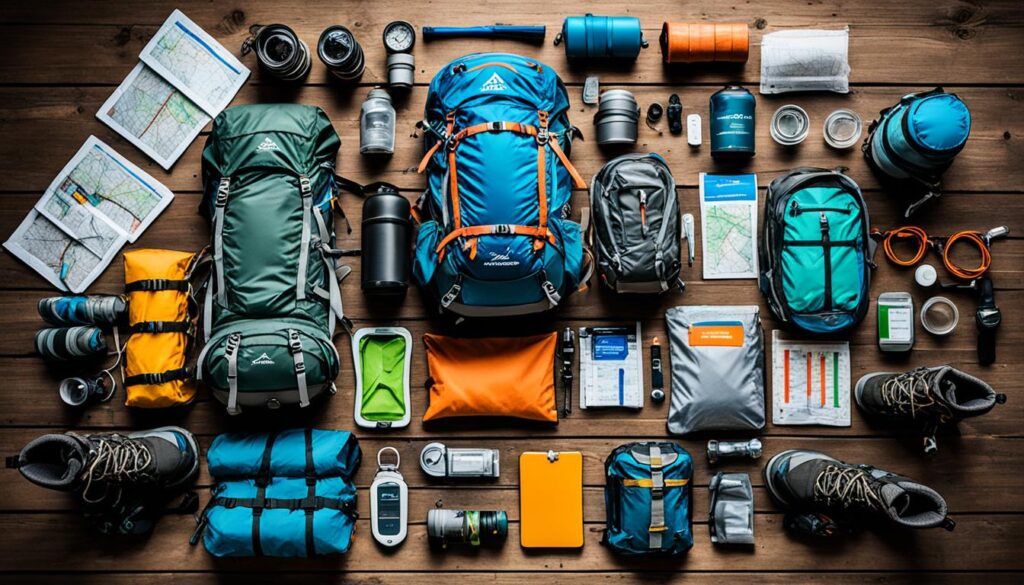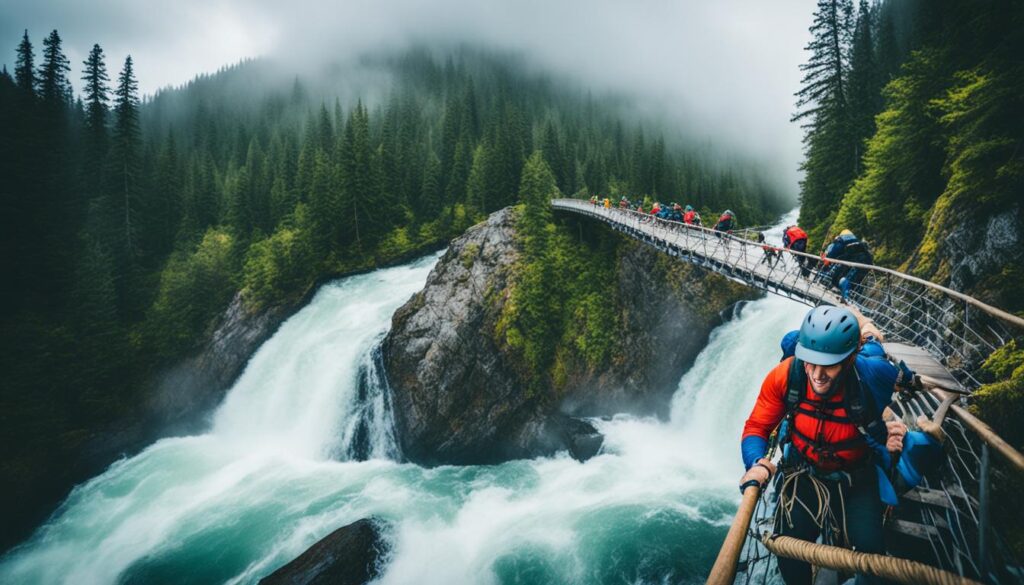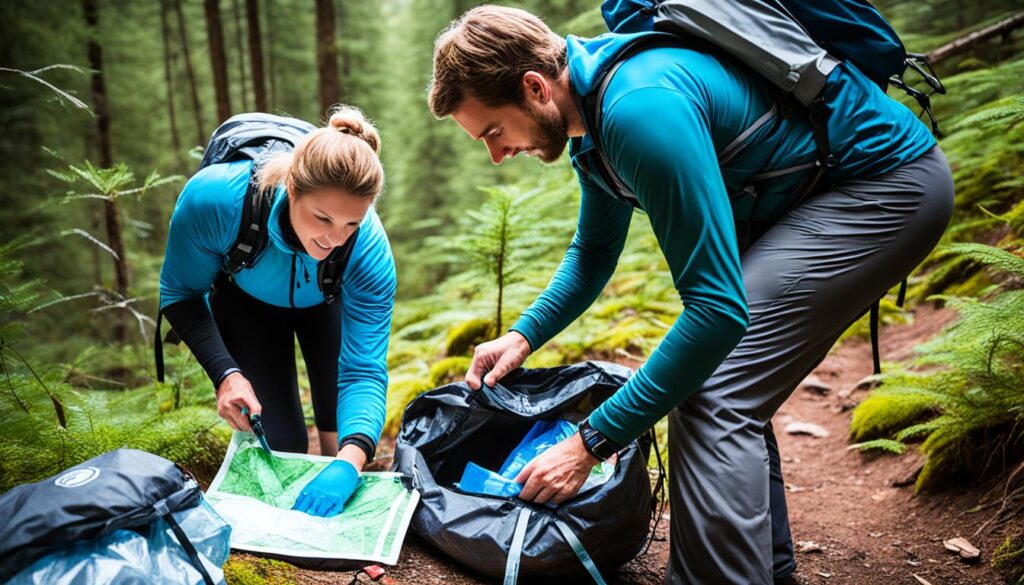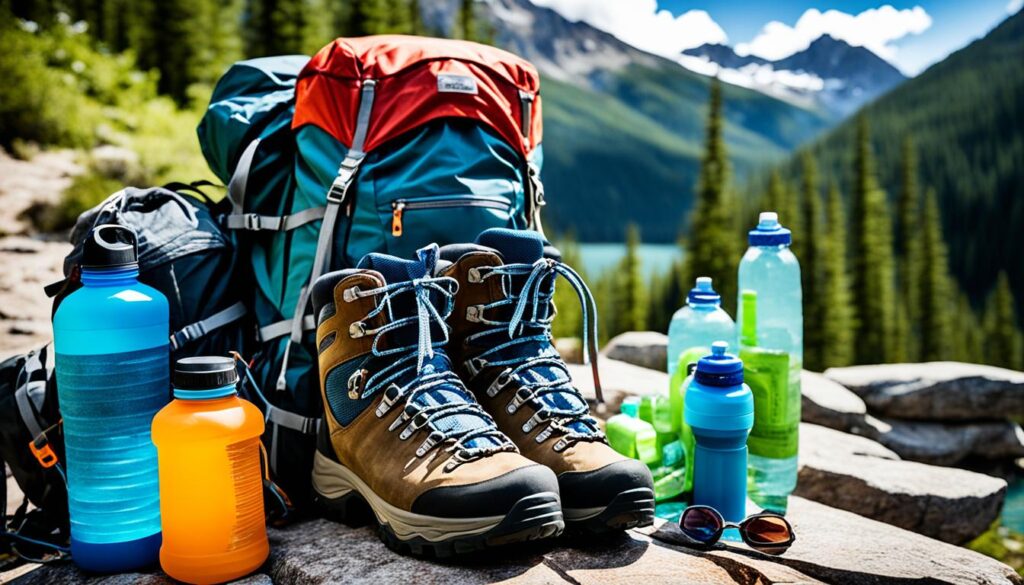Welcome to the Beginner’s Guide to Hiking Trips! Whether you’re looking to explore the great outdoors or simply embark on a new adventure, hiking is the perfect activity for beginners. In this guide, I will provide you with all the essential information and tips you need to get started on your hiking journey. From choosing the right gear to planning your hike and staying safe on the trails, this guide has got you covered. So, let’s lace up our boots and dive into the world of hiking for beginners!
Key Takeaways:
- Hiking is a fantastic outdoor activity for beginners.
- Proper gear selection is crucial for a successful hiking trip.
- Planning and preparation are key to a safe and enjoyable hike.
- Hiking offers numerous physical and mental health benefits.
- Consider joining a guided hiking trip to kickstart your hiking adventures.
Contents
- 1 What Is Hiking?
- 2 Hiking for Beginners: How to Start Hiking
- 3 Packing for a Hike: Hiking Gear and What to Pack for Hiking
- 4 Hiking Safety
- 5 Hiking Responsibly
- 6 Benefits of Hiking for Beginners
- 7 Choosing the Right Hiking Trail for Beginners
- 8 Planning Your First Hike: Hiking Tips for Beginners
- 9 Getting Started with Beginner Hiking Vacations
- 10 Tips for Overcoming Hiking Challenges
- 11 Conclusion
- 12 FAQ
- 13 Source Links
What Is Hiking?
Hiking is a form of outdoor activity that allows individuals to connect with nature while enjoying physical exercise. It involves walking in natural environments such as mountains, forests, meadows, and even urban areas. Whether it’s a leisurely stroll or a challenging trek, hiking offers a range of trails suitable for all skill levels. For beginners, it’s essential to start with beginner-friendly hikes that provide a safe and enjoyable experience.
Beginner-friendly hiking trails are designed for individuals who are new to hiking or have limited experience. These trails are typically well-marked, well-maintained, and offer manageable distances and elevations. They provide a great opportunity for beginners to explore nature, build their endurance, and develop their hiking skills.
When selecting hiking trails for beginners, it’s important to consider the following factors:
- Difficulty level: Choose trails with an easy or moderate difficulty rating to ensure a comfortable experience.
- Distance: Opt for trails that can be completed in a day to start with. This allows beginners to gradually increase their hiking abilities over time.
- Terrain: Select trails with gentle slopes and well-defined paths to avoid challenging terrain.
- Accessibility: Look for trails that are easily accessible and have amenities such as parking, restrooms, and picnic areas.
“The journey of a thousand miles begins with a single step.” – Lao Tzu
Starting with beginner-friendly hikes provides beginners with a positive introduction to hiking. It allows them to enjoy the beauty of nature, appreciate the benefits of outdoor activity, and build confidence in their abilities. Over time, beginners can gradually explore more challenging hikes and embark on longer, multi-day treks.
Exploring beginner-friendly hiking trails not only provides physical exercise but also offers opportunities for relaxation, self-reflection, and connection with nature. It’s a wonderful way to escape the hustle and bustle of everyday life and immerse oneself in the tranquility of natural surroundings.
Next, we will delve into how to start hiking and provide useful tips for beginners to embark on their first hiking adventure.
Hiking for Beginners: How to Start Hiking
Are you ready to embark on your first hiking adventure? As a beginner, it’s important to start hiking with the right knowledge and preparation. In this section, I will guide you through the step-by-step process of starting your hiking journey and making the most of your beginner hiking trips.
1. Determine Your Fitness Level and Choose a Suitable Trail
Before hitting the trails, it’s essential to assess your fitness level. This will help you choose a trail that aligns with your abilities and avoids any unnecessary challenges. Start with shorter and easier hikes that allow you to gradually build your endurance and skill level.
“The journey of a thousand miles begins with a single step.” – Lao Tzu
Remember, the goal is to enjoy the experience and build confidence along the way. Research beginner-friendly hiking trails in your area or consult with local outdoor guides for recommendations. By selecting a suitable trail, you’ll set yourself up for a positive hiking experience.
2. Consider the Weather and Pack Essential Gear
Weather conditions can significantly impact your hiking experience. Keep an eye on weather forecasts and plan your hike accordingly. Dress appropriately for the conditions and layer your clothing to accommodate temperature changes.
Additionally, packing essential gear is crucial for a safe and comfortable hike. Here are some items you should consider:
- Hiking boots with proper ankle support
- Comfortable and moisture-wicking clothing
- Sun protection (hat, sunscreen, sunglasses)
- A backpack to carry essentials
- Water bottles or hydration bladder
- Snacks and meals for energy
- A map, compass, or GPS device for navigation
- A first aid kit for emergencies
Don’t forget to pack your sense of adventure!
3. Plan Your Route Before Heading Out
Proper planning ensures a smooth hiking experience. Before you set foot on the trail, familiarize yourself with the route. Study the map, understand the trail markers or signs, and identify any potential hazards or points of interest along the way.
Make note of the estimated duration of the hike, so you can allocate enough time for breaks and reaching your destination. Let someone know your whereabouts and when you expect to return, especially if you’re hiking alone.
4. Enjoy the Journey and Stay Safe
Now that you’re prepared, it’s time to hit the trail! During your hike, take in the beautiful scenery and embrace the serenity of nature. Listen to the sounds, breathe in the fresh air, and let hiking rejuvenate your mind and body.
However, safety should always be a top priority. Stay on marked trails and follow any guidelines or regulations provided. Be aware of your surroundings and use caution when encountering wildlife or crossing streams.
Remember, hiking is an opportunity to disconnect from the daily grind and connect with the natural world. Embrace the adventure and make lasting memories along the way.
| Tips for Starting Hiking | Benefits of Beginner Hiking Trips |
|---|---|
| 1. Determine your fitness level and choose a suitable trail. | 1. Explore new terrain and environments. |
| 2. Consider the weather and pack essential gear. | 2. Improve cardiovascular fitness and stamina. |
| 3. Plan your route and inform someone about your plans. | 3. Strengthen muscles and improve overall physical health. |
| 4. Stay on marked trails and follow safety guidelines. | 4. Experience mental relaxation and stress reduction. |

Starting your hiking journey as a beginner is an exciting and rewarding experience. Follow these tips and embark on unforgettable beginner hiking trips. And remember, the best way to become a more experienced hiker is to keep exploring and challenging yourself on new trails!
Packing for a Hike: Hiking Gear and What to Pack for Hiking
Proper packing is essential for a successful hiking trip. As a beginner, it’s important to invest in good-quality hiking gear to ensure your comfort and safety on the trail. Here’s a detailed list of hiking gear you should pack for an unforgettable hiking experience:
Hiking Gear Checklist
| Item | Quantity |
|---|---|
| Hiking boots | 1 pair |
| Hiking socks | 2-3 pairs |
| Backpack | 1 |
| Hiking clothes (moisture-wicking and layerable) | 1 set per day |
| Hat and sunglasses | 1 each |
| Sunscreen | 1 bottle |
| Insect repellent | 1 bottle |
| Hiking poles | 1-2 |
| Map and compass/GPS | 1 each |
| First aid kit | 1 |
| Headlamp/flashlight | 1 |
| Water bottles/hydration bladder | 1-2 |
| Snacks/energy bars | As needed |
| Emergency food | 1 meal |
| Knife or multi-tool | 1 |
| Whistle | 1 |
| Rain jacket/poncho | 1 |
| Extra clothing layers | As needed |
| Trash bag | 1 |
| Cell phone and charger | 1 each |
| Camera | 1 |
It’s crucial to pack enough water and food to sustain you throughout the hike. Always carry a water filter or purification tablets if you’ll be drinking water from natural sources. Additionally, consider the weather conditions and pack appropriate clothing layers to stay warm and dry.Remember, the key to a successful hike is being prepared. Pack your hiking gear in a well-organized manner, distributing weight evenly in your backpack, and always double-check your gear before hitting the trails.

Hiking Safety
When it comes to hiking, safety should be your top priority. Whether you’re a beginner or an experienced hiker, taking proper precautions can make all the difference in ensuring a safe and enjoyable journey. Here are some important safety measures to keep in mind:
- Research trails: Before setting out on a hike, it’s essential to research the trail you’ll be exploring. Understand the difficulty level, terrain, and any potential hazards that may be present along the way.
- Inform others: Always let someone know about your hiking plans, including the trail you’ll be on and the estimated time of return. This ensures that someone will be aware of your whereabouts in case of an emergency.
- Stay hydrated and nourished: Hiking requires physical exertion, so it’s crucial to stay hydrated by drinking plenty of water throughout your journey. Carry snacks or meals to keep your energy levels up during long hikes.
- Wear proper clothing and footwear: Dressing appropriately for the weather conditions and wearing sturdy hiking boots with good traction are essential for your safety and comfort on the trails.
- Be aware of wildlife and weather conditions: Keep an eye out for any wildlife that you may encounter on the trails and maintain a safe distance. Additionally, check the weather forecast before heading out to avoid any unexpected storms or extreme conditions.
- Practice Leave No Trace principles: As a responsible hiker, make sure to leave the trail as you found it. Dispose of any waste properly, respect wildlife and vegetation, and stay on designated trails to minimize your impact on the wilderness.

By following these hiking safety guidelines, beginners can embark on their hiking trips with confidence and peace of mind, knowing that they are well-prepared for any situation that may arise. Remember, safety should never be compromised when it comes to enjoying the beauty and serenity of the wilderness.
Hiking Responsibly
Hiking responsibly is not only about enjoying the great outdoors, but also about preserving the natural beauty for future generations. It is our responsibility as hikers to respect the environment and practice sustainable hiking ethics. One of the key principles of responsible hiking is the Leave No Trace (LNT) philosophy, which encourages hikers to minimize their impact on the trail and surrounding areas.
Leave No Trace Principles
The Leave No Trace principles provide a set of guidelines that promote responsible hiking and ensure the preservation of our natural resources. By following these principles, beginners can contribute to the sustainable management of hiking trails and protect the delicate ecosystems they pass through.
- Pack out trash: Always carry a trash bag with you and make sure to pack out all your trash, including food wrappers, tissue paper, and any other waste. Leave the trail as clean or cleaner than you found it.
- Camp responsibly: Set up your campsites in designated areas to minimize your impact on the environment. Follow the guidelines for campfire use, and if allowed, use established fire rings or campsites.
- Stay on designated trails: Stick to established trails and avoid creating new ones, even if it means taking a detour. This helps protect fragile vegetation and reduces soil erosion.
- Minimize your impact: Be aware of your surroundings and take steps to minimize your impact on natural resources. Avoid damaging plants, disturbing wildlife, or disrupting natural water sources.
Benefits of Responsible Hiking
Practicing responsible hiking has several benefits, not only for the environment but also for hikers themselves. By adhering to sustainable hiking ethics and the Leave No Trace principles, beginners can:
- Preserve the natural beauty of hiking trails and ensure their enjoyment for future generations.
- Contribute to the conservation of fragile ecosystems and protect wildlife habitats.
- Enhance their hiking experience by immersing themselves in pristine environments.
- Set an example for others and inspire them to adopt responsible hiking practices.
- Create a sense of accomplishment and fulfillment by knowing they are leaving a positive impact on the environment.

| Principles | Benefits |
|---|---|
| Pack out trash | Keeping trails clean and preserving the natural beauty |
| Camp responsibly | Minimizing impact on the environment and maintaining designated campsites |
| Stay on designated trails | Protecting fragile vegetation and reducing soil erosion |
| Minimize your impact | Preserving natural resources and minimizing disturbance to wildlife |
Benefits of Hiking for Beginners
Hiking is not only a wonderful way to connect with nature and explore new trails, but it also offers numerous benefits for beginners, both physically and mentally. Whether you’re embarking on a short day hike or a longer expedition, the rewards of hiking extend far beyond the trails.
Physical Health Benefits of Hiking
Hiking is a fantastic form of exercise that provides a range of physical health benefits for beginners. Here are some of the key advantages:
- Improves Cardiovascular Health: Hiking gets your heart pumping, increasing your cardiovascular endurance and strengthening your heart muscles. Regular hiking can reduce the risk of heart disease, lower blood pressure, and improve overall heart health.
- Strengthens Muscles: Hiking engages various muscle groups, including your legs, core, and glutes. Uphill climbs and uneven terrains provide resistance, helping to build strength and tone muscles.
- Aids in Weight Loss: Hiking is a great way to burn calories and shed excess pounds. Uphill hiking and traversing rough terrain require more energy, resulting in increased calorie expenditure and contributing to weight loss goals.
- Reduces the Risk of Chronic Diseases: Regular hiking can help lower the risk of chronic conditions such as obesity, diabetes, and certain types of cancer. It improves insulin sensitivity, lowers blood sugar levels, and promotes healthy weight management.
Mental Health Benefits of Hiking
Hiking not only benefits your physical well-being but also has a positive impact on your mental health. Here’s how hiking can enhance your emotional well-being:
- Reduces Stress and Anxiety: Spending time in nature and engaging in physical activity can reduce stress and anxiety levels. Hiking allows you to unplug from daily pressures, connecting with the natural world and promoting a sense of calm and relaxation.
- Improves Mood: Engaging in outdoor activities like hiking stimulates the release of endorphins, also known as “feel-good” hormones. These hormones boost your mood and contribute to a sense of happiness and well-being.
- Promotes Mindfulness: Hiking provides an opportunity to practice mindfulness by immersing yourself in the present moment. As you focus on your surroundings, the sounds of nature, and your breath, hiking cultivates mindfulness and enhances your overall mental clarity.

The combination of physical activity, fresh air, and natural landscapes makes hiking a powerful antidote to the stresses of daily life. Hiking allows you to escape the confines of urban environments and experience the therapeutic effects of nature.
“Hiking is not just an activity; it’s a way to nurture your body and calm your mind.”
– Unknown
So, whether you’re looking to boost your fitness level, explore the great outdoors, or find a rejuvenating escape, hiking is the perfect activity for beginners, offering both physical and mental health benefits.
Choosing the Right Hiking Trail for Beginners
When it comes to beginner hiking trails, choosing the right one is key to having a positive and enjoyable experience. As a beginner, you want to find a trail that matches your fitness level and provides a good balance of challenge and enjoyment. Here are some tips on how to choose the perfect hiking trail:
Consider the Difficulty Level
As a beginner, it’s important to start with a trail that matches your current fitness level. Look for trails that are labeled as “beginner-friendly” or have an easy difficulty rating. These trails often have minimal elevation gain, well-maintained paths, and shorter distances. Gradually increase the difficulty level as you gain more experience and confidence.
Assess the Distance and Elevation Gain
When choosing a hiking trail, consider the distance and elevation gain. Longer trails and steep climbs may be more challenging for beginners. It’s a good idea to start with shorter trails that can be completed in a few hours. As you gain experience and build endurance, you can gradually tackle longer and more challenging hikes.
Look for Beginner-Friendly Trails
There are many resources available to help you find beginner-friendly hiking trails. Online platforms such as AllTrails and Hiking Project provide detailed trail descriptions, difficulty ratings, and reviews from hikers. Local outdoor shops and visitor centers are also great sources of information and may have maps or guidebooks specifically for beginners. Additionally, reaching out to experienced hikers and asking for recommendations can lead you to hidden gems.
“Choosing a trail that matches your fitness level and provides a good balance of challenge and enjoyment is crucial for beginners.”

Consider Trail Accessibility
Accessibility is an important factor to consider when choosing a hiking trail. Look for trails that are easily accessible from your location or have parking areas nearby. Trails with well-marked trailheads and clear signage also make it easier for beginners to navigate. Besides accessibility, take note of any trail regulations or permits that may be required.
Prepare for Your Hike
Before heading out on your chosen hiking trail, make sure you are well-prepared. Research the trail conditions and weather forecast, and plan accordingly. Pack essential hiking gear such as sturdy boots, sunscreen, a hat, plenty of water, and snacks. Let someone know your plans and when you expect to return. And always remember to carry a map and compass or use a navigation app on your phone in case you need directions.
By following these tips and taking the time to choose a hiking trail that matches your abilities and interests, you can embark on a beginner hiking journey that is enjoyable, safe, and rewarding.
Planning Your First Hike: Hiking Tips for Beginners
Planning is essential when it comes to embarking on your first hiking adventure. By taking the time to prepare and organize, you can ensure a smooth and enjoyable experience. Here are some practical tips to help you plan your first hike:
- Research the Trail: Before heading out, research different trails in your area to find one that suits your preferences and skill level. Look for beginner-friendly trails that offer beautiful scenery and manageable distances.
- Check the Weather: Always check the weather forecast for the day of your hike. This will help you decide what clothing and gear to pack and ensure that you are prepared for any weather conditions you might encounter.
- Create an Itinerary: Plan your hike by creating a detailed itinerary. This should include the starting point, route, estimated time, and any points of interest along the way. Having an itinerary will help you stay organized and ensure that you don’t miss anything important.
- Inform Others: Before heading out on your hike, let someone know about your plans. Share your itinerary with a trusted friend or family member and provide them with an estimated return time. This way, if something goes wrong, someone will know where to find you.
- Pack Essential Gear: Make sure you have the right gear for your hike. This includes proper footwear, a comfortable backpack, navigation tools like a map and compass, a first aid kit, and enough food and water to sustain you throughout the hike. Don’t forget to pack a headlamp or flashlight and extra batteries, especially if you plan to hike during dusk or dawn.
Remember, preparation is key to a successful hike. Taking the time to plan and prepare will ensure that you have everything you need and help you have a safe and enjoyable hiking experience.
Hiking Navigation Tips
When hiking, it’s important to have basic navigation skills to ensure you stay on the right track. Here are a few navigation tips for beginners:
- Carry a Map and Compass: Always carry a detailed map of the trail and know how to use a compass. These tools will help you navigate your way through the trail and find your destination.
- Follow Trail Markers: Many hiking trails have trail markers such as signs, blazes, or cairns. These markers indicate the direction of the trail and can help you stay on the right path. Pay close attention to these markers and follow them.
- Use GPS Devices: If you’re comfortable using GPS devices, they can be a helpful tool for navigation. GPS devices can track your location and provide guidance on the trail. Just make sure to bring extra batteries or a power bank to keep your device charged.
By following these navigation tips, you can confidently navigate your way through the trail and enjoy your hiking adventure.
Hydration and Food Options
Proper hydration and nutrition are crucial during a hike, especially for beginners. Here are some tips on staying hydrated and fueling your body:
- Drink Plenty of Water: Carry enough water to keep yourself hydrated throughout the hike. Take regular sips of water, especially during breaks, to prevent dehydration.
- Pack Healthy Snacks: Pack lightweight and nutritious snacks such as trail mix, energy bars, fruits, and nuts. These snacks will provide you with the necessary energy and nutrients to keep you going.
- Consider Meal Planning: If you’re planning a full-day hike, consider packing a packed lunch. Sandwiches, wraps, and pre-cooked meals can be great options for a satisfying meal on the trail.
Remember to listen to your body and eat and drink regularly to maintain your energy levels throughout the hike.
| Hiking Tips | Description |
|---|---|
| Start with Shorter Hikes | Beginners should start with shorter hikes to build endurance and confidence. |
| Choose the Right Time | Pick a time of the day when the weather is suitable and the trail is less crowded. |
| Wear Comfortable Clothing | Wear moisture-wicking and breathable clothing to keep you comfortable during the hike. |
| Take Breaks | Take regular breaks to rest, hydrate, and enjoy the scenery. |
| Leave No Trace | Follow the principles of Leave No Trace to minimize your impact on the environment. |
By following these hiking tips, beginners can have a safe and enjoyable hiking experience.

Getting Started with Beginner Hiking Vacations
Beginner hiking vacations are a fantastic way to explore new destinations and immerse yourself in the beauty of the outdoors. Whether you’re a novice hiker or just looking to take your hiking adventures to the next level, guided hiking trips offer a range of benefits tailored to beginners. From expert guidance and organized itineraries to the opportunity to connect with like-minded individuals, these vacations provide the perfect platform for beginner hikers to embark on their hiking journey.
Expert Guidance: One of the key advantages of beginner hiking vacations is the access to expert guidance. Professional guides will accompany you throughout the trip, ensuring your safety and providing valuable insights into the local flora and fauna, geography, and culture. They will also offer tips and techniques to help you enhance your hiking skills while providing encouragement and support along the way.
Organized Itineraries: Planning a hiking trip as a beginner can be overwhelming. With beginner hiking vacations, all the logistics are taken care of. You can simply focus on enjoying the experience while the tour operator plans the route, arranges accommodations, and organizes meals. This hassle-free approach allows you to fully immerse yourself in your surroundings without the stress of planning every detail.
Meeting Like-Minded Individuals: Beginner hiking vacations offer the unique opportunity to meet fellow hikers who share the same passion for outdoor adventures. You’ll have the chance to connect with individuals from different walks of life, exchange stories and tips, and create lasting friendships. Together, you can motivate and inspire each other during your hiking journey.
Popular Beginner Hiking Vacation Destinations
When it comes to beginner hiking vacations, there are countless destinations to choose from. Here are some popular options that cater to beginners:
- Rocky Mountain National Park, Colorado: Explore the breathtaking landscapes of this national park, with trails of varying difficulty levels suitable for beginners.
- Yosemite National Park, California: Discover the iconic beauty of Yosemite and hike along scenic trails that showcase its stunning waterfalls, granite cliffs, and meadows.
- Great Smoky Mountains, North Carolina and Tennessee: Immerse yourself in the beauty of this UNESCO World Heritage Site with its diverse flora and fauna and beginner-friendly hiking trails.
- Acadia National Park, Maine: Experience the charm of the East Coast with hikes that offer breathtaking coastal views, lush forests, and the iconic Cadillac Mountain.
These are just a few examples, and there are many more destinations worldwide that offer beginner-friendly hiking vacations. It’s important to research the trails, climate, and difficulty levels to find the perfect fit for your hiking abilities and personal preferences.
Hiking Tour Operators for Beginners
If you’re considering a beginner hiking vacation, there are several reputable tour operators that specialize in catering to beginners:
| Tour Operator | Website |
|---|---|
| REI Adventures | www.rei.com/adventures |
| Exodus Travels | www.exodus.co.uk |
| Backroads | www.backroads.com |
| G Adventures | www.gadventures.com |
These tour operators offer a range of beginner-friendly hiking trips, from short excursions to multi-day adventures. They provide expert guides, organized itineraries, and a supportive and inclusive environment for beginners.
Investing in a guided beginner hiking vacation ensures that you have a tailored and memorable experience while building your confidence and skills as a hiker. With expert guidance, organized itineraries, and the opportunity to connect with fellow hiking enthusiasts, beginner hiking vacations offer the perfect starting point for your hiking journey.
Tips for Overcoming Hiking Challenges
Hiking for beginners can be both exciting and challenging. As you embark on your hiking journey, you may encounter various obstacles that can test your physical and mental endurance. However, with the right mindset and preparation, you can overcome these challenges and make the most of your hiking experience. Here are some tips to help you overcome common hiking challenges:
1. Pacing Yourself
One of the key aspects of successful hiking is pacing yourself. It’s important to find a comfortable pace that allows you to maintain a steady rhythm throughout your hike. Avoid pushing yourself too hard at the beginning, as it can lead to fatigue and burnout later on. Remember, hiking is not a race, but a journey to be enjoyed and savored.
2. Listening to Your Body
Pay close attention to your body’s signals while hiking. If you start feeling fatigued or experiencing discomfort, take short breaks to rest and recharge. Hydrate and refuel your body with nutritious snacks to maintain energy levels. By listening to your body and addressing its needs, you can prevent exhaustion and keep going strong.
3. Seeking Support from Fellow Hikers
Hiking can be a wonderful opportunity to connect with like-minded individuals who share your passion for the outdoors. Don’t hesitate to seek support and encouragement from fellow hikers when facing challenges. Share your experiences, ask for advice, and learn from their expertise. The hiking community is often welcoming and supportive, and their guidance can help you overcome difficulties along the trail.
4. Resolving Navigation Difficulties
Getting lost or facing navigation difficulties can be intimidating, especially for beginner hikers. To overcome this challenge, familiarize yourself with the trail map and consider using a GPS device or hiking app for added guidance. Additionally, carrying a compass and learning basic navigation skills can provide you with a sense of direction and confidence while exploring new trails.
5. Addressing Blisters and Foot Discomfort
Blisters and foot discomfort are common issues faced by hikers, particularly on longer hikes. To prevent blisters, invest in proper-fitting hiking shoes or boots and wear moisture-wicking socks. Take regular breaks to air out your feet and apply moleskin or blister pads if necessary. Remember, taking care of your feet is crucial for a comfortable and enjoyable hiking experience.
By embracing these tips and persevering through challenges, you can overcome obstacles encountered during hiking trips. Remember, each challenge presents an opportunity for growth and personal accomplishment. So, lace up your hiking boots, be prepared, and embark on an unforgettable hiking adventure!
Conclusion
Hiking is an incredibly rewarding and accessible outdoor activity for beginners. Whether you’re seeking a short escape or a longer adventure, hiking trips for beginners offer a wealth of possibilities. By starting with easy hikes, planning and preparing adequately, and following safety guidelines, you can embark on unforgettable journeys through nature’s wonders.
Not only does hiking provide a chance to connect with the natural world, but it also offers a host of physical and mental health benefits. From improving cardiovascular fitness and building strength to reducing stress and promoting mindfulness, hiking has something to offer everyone. So, lace up your hiking boots, gather your gear, and get ready to embrace the beauty of the outdoors.
Remember, as a beginner, it’s important to choose trails that match your abilities and fitness level. Gradually increase the difficulty as your skills and endurance grow. Additionally, pack the necessary gear, stay informed about trail conditions and weather forecasts, and always practice Leave No Trace principles to preserve the environment for future generations.
With the right preparation, beginner hiking trips can be an enriching and transformative experience. So, seize the opportunity and let the trails guide you to new adventures, breathtaking vistas, and a deeper connection to the natural world. Happy hiking!
FAQ
What is hiking?
Hiking is a form of outdoor activity that involves walking in nature. It can range from short walks to long-distance treks and can take place in various terrains like mountains, forests, meadows, and even urban areas.
How do I start hiking as a beginner?
To start hiking, beginners should first determine their fitness level and choose a trail that suits their abilities. It’s important to start with shorter and easier hikes and gradually increase the difficulty level. Beginners should also consider the weather, pack essential gear, and plan their route before heading out.
What gear do I need for hiking?
Beginners should invest in good-quality hiking gear such as hiking boots, backpacks, clothing layers, and navigation tools. They should also pack essentials like water, food, first aid, and emergency supplies.
How can I stay safe while hiking?
Safety is paramount when hiking, especially for beginners. Important safety measures include researching trails, informing others about your plans, staying hydrated and nourished, wearing proper clothing and footwear, being aware of wildlife and weather conditions, and practicing Leave No Trace principles.
What are the benefits of hiking for beginners?
Hiking offers numerous benefits for beginners, both physically and mentally. It improves cardiovascular health, strengthens muscles, aids in weight loss, and reduces the risk of chronic diseases. Hiking also provides mental health benefits, such as reducing stress and anxiety, improving mood, and promoting mindfulness.
How do I choose the right hiking trail as a beginner?
Factors such as difficulty level, distance, elevation gain, trail type, and accessibility should be considered when choosing a hiking trail. Online resources, local outdoor shops, and recommendations from experienced hikers can help beginners find beginner-friendly hiking trails.
How do I plan my first hike as a beginner?
Planning is key to a successful hiking trip for beginners. Practical tips include researching the trail, checking the weather, creating an itinerary, informing others about your plans, and packing essential gear. Navigation, hydration, and food options during the hike should also be considered.
Can I go on a hiking vacation as a beginner?
Yes, beginner hiking vacations offer a great way to explore new destinations while enjoying the outdoors. They provide expert guidance, organized itineraries, and the opportunity to meet like-minded individuals. Popular beginner hiking vacation destinations and tour operators can help beginners find tailored and memorable hiking experiences.
What are some tips for overcoming hiking challenges as a beginner?
Hiking for beginners can come with its own set of challenges. Tips for overcoming common challenges include pacing oneself, listening to the body, and seeking support from fellow hikers. This will help beginners overcome challenges and enjoy the rewards of hiking.






